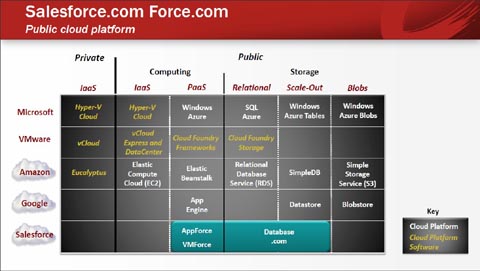During the first day at the Jazoon Conference, David Chappell gave an interesting keynote about the opportunities brought by the Cloud that he defines as a new available platform for software developers. His presentation was good, mixing both general overview information and more technical considerations that could interest software developers.
He focused mainly on the public cloud, even if the if he thinks that it is the private cloud (a denomination that should never have been used according to him) that will influence the offer of public solutions. The Cloud offering can be characterized as self-service, granular and without commitments. Private and public Clouds share the same technology but satisfy different needs. This leads him to think that the future will be in hybrid Clouds. As organizations will want that their applications in both public and private Clouds cooperate, a successful technology in private clouds should also see a wide adoption in the public suppliers of Cloud infrastructure. The infrastructure as a service (IaaS) is the equivalent of getting virtual machines (VM) on demand. You have great power, but you have to manage everything yourself. Platform as a service (PaaS) allows running an application, but without controlling the infrastructure. The IaaS market is currently more important than the PaaS market, because people feel more confident to manage their Cloud VM. David Chappell thinks however that PaaS will be the larger market in the future as customers will feel confident to abandon the responsibilities that come with control.
There are many scenarios where organizations should consider using a Cloud infrastructure:
* Setting up temporary development and testing environment
* Applications with variable load like ticketing systems
* Parallel processing
* Start-up applications that could be massively scaled or quickly killed
* Undefined lifetime applications like the one that could support marketing campaign
* Business units that want to avoid dealing with their IT department ;o)

David Chappell finished his talk with a comparison of main Cloud suppliers. He mentioned that the winner of the current public cloud market could ends up as the winner of the private cloud market, which will mainly offer the same technology, but in a private environment. Microsoft, VMware and Amazon are the main contenders as they cover the full range of technology. Google with its App Engine is seen as a second-tier player, because it started on a wrong foot targeting only the python world initially. Salesforce is playing in a different perspective as it focus more directly on business users, allowing them to bypass their IT department. Apparently, users are happy to do this, even if they are locked in proprietary tools. Salesforce.com also charges on a user basis instead of the resource usage tariff proposed by its competitors.
Conference web site: http://jazoon.com/
Presentation slides: http://jazoon.com/Downloads/Documents


Pingback: Software Linkopedia August 2011
I believe Salesforce.com “owns” Heroku, which is a platform play for specific-frameworks (similar to Google App Engine). Not sure why SF doesn’t emphasize this in their _portfolio_ of products.
You are right, Salesforce.com signed an agreement to acquire Heroku in December 2010. The discretion about this could be that Salesforce.com labeled itself as a “end-users” company and Heroku targets the developer market.